
Over 25% of Google searchers only ever click on first result. That tells you how important keyword research is for lawyers.
If you’re not featured on the first page for your targeted keywords, most people won’t find you, and you’ll miss out on traffic, leads, and clients.
There’s no getting around the fact that to feature anywhere near the top of search results, you’ll need to do some keyword research.
Fortunately, if you hire SEO experts, they can do the legwork for you. In either case, it doesn’t hurt to know a little more about what keyword research for lawyers is and how to go about it.
By the end of this article, you’ll:
Let’s get into it.
Keyword research is the process where you dig into what people type into search engines when they’re on the hunt for information.
For lawyers, this means figuring out the specific phrases potential clients use when they’re searching for legal help online. It’s not just about finding popular terms; it’s about understanding the exact questions and issues on people’s minds.
Keywords form the foundation of your SEO, your law firm’s website (metadata, URLs, etc.), and also a law firm’s content marketing strategy.

More than that, here’s why keyword research for lawyers matters:
It’s fair to say that your starting point with all lawyer marketing activities is to find out what people in your target audience are searching for most frequently.
Before we go deeper, let’s remind ourselves about some keyword fundamentals.
Ideally, you want your website and content to rank as highly as possible on page one of Google for many relevant keywords.
Put another way, when your target audience types in a search term related to your practice area, you want them to be directed to your content rather than your competitors’.
Let’s go over the 3 basics of keyword research.
Let’s break down two critical concepts you’ll come across: keyword volume and difficulty.
Understanding these will help you pick your battles wisely in the vast landscape of search engine optimization (SEO).
Now, you might think the goal is to find high-volume, low-difficulty keywords, and you’d be right, to an point.
But it’s not just about reaching for the low-hanging fruit. It’s about strategic alignment with your firm’s specialties and the specific needs of your potential clients. Sometimes, a keyword with lower volume but very relevant to your practice could be more valuable than a generic high-volume term.
It’s about quality over quantity. Take a look at these examples.
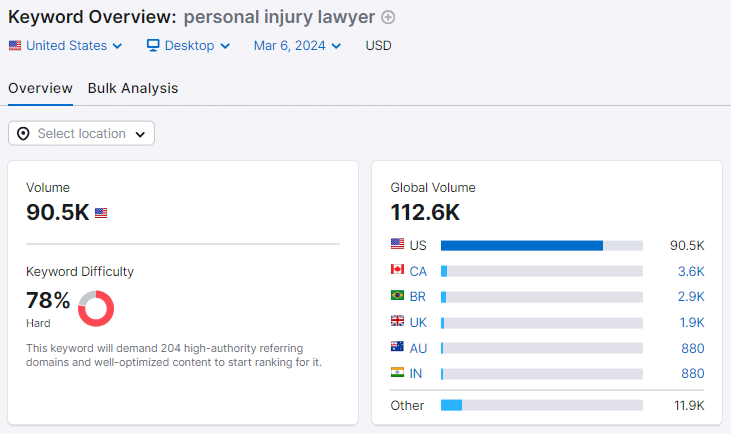
The keyword “personal injury lawyer” might seem like the obvious choice to go for. It has over 90,000 searches a month after all.
But consider a scenario where you only service one city, like San Diego. It would not only be easier but also more lucrative to rank for “San Diego personal injury lawyer” despite its lower volume.
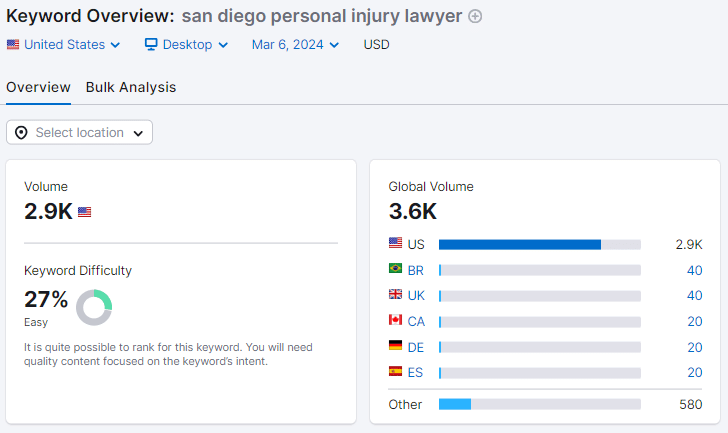
You want to attract traffic that’s not just large in numbers but is also highly relevant — people genuinely looking for the legal services you offer.
This means sometimes going after more niche keywords that perfectly match your expertise, even if they have a smaller volume, because the traffic they bring is more likely to convert into actual clients.
There are three types of keywords for lawyers to focus on:
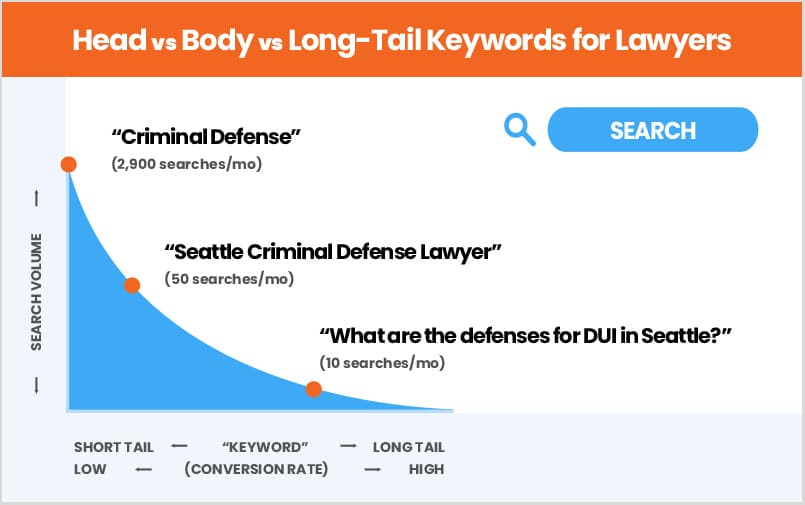
As you can see from the above graphic, search volume and conversion rate generally have an inverse correlation, so targeting the most popular keywords is rarely the right strategy for law firm SEO.
There are many theories on the types of keywords you should target with SEO campaigns.
I find that aligning your keyword targeting with the typical customer journey is the most effective approach. This means understanding the search intent behind each query entered into Google.
It’s important to note that more than 95.88 percent of Google searches consist of queries with over four words. This highlights the significance of targeting the right phrases, especially through long-tail keywords, as they can yield substantial opportunities for law firms.
Long-tail keywords give law firms a competitive edge by allowing them to focus on less competitive yet highly relevant phrases. They might attract less overall traffic, but these keywords often signal a higher purchase intent or specific legal needs, making them more likely to convert into paying clients.
Each keyword has an implicit intent.
For those readers unfamiliar with the “customer journey,” here is a simplified overview.
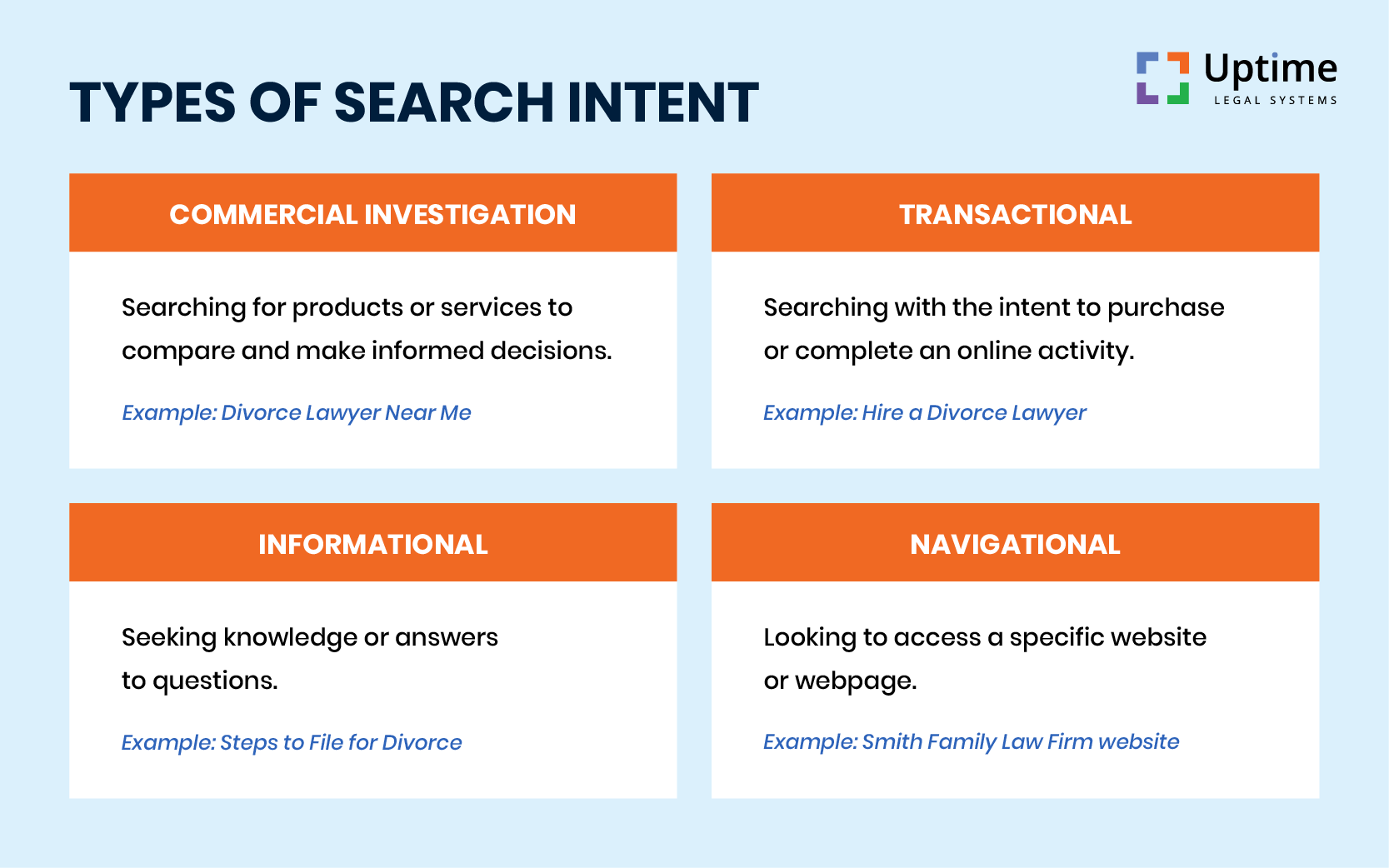
The best SEO keyword strategy maps to specific user intent based on where they are in the customer journey.
Search intent can vary, but let’s take this example of a customer journey. Say someone recently received a DUI.
They could potentially follow this search pattern:
Let’s compare the following 4 search queries.
Let’s say they search for “DWI Laws in San Antonio.”
The intent of this query is less obvious. The user is simply searching for general information and Google delivers a different search results page.
Google features the firms that provide the best and most relevant information relating to the query.
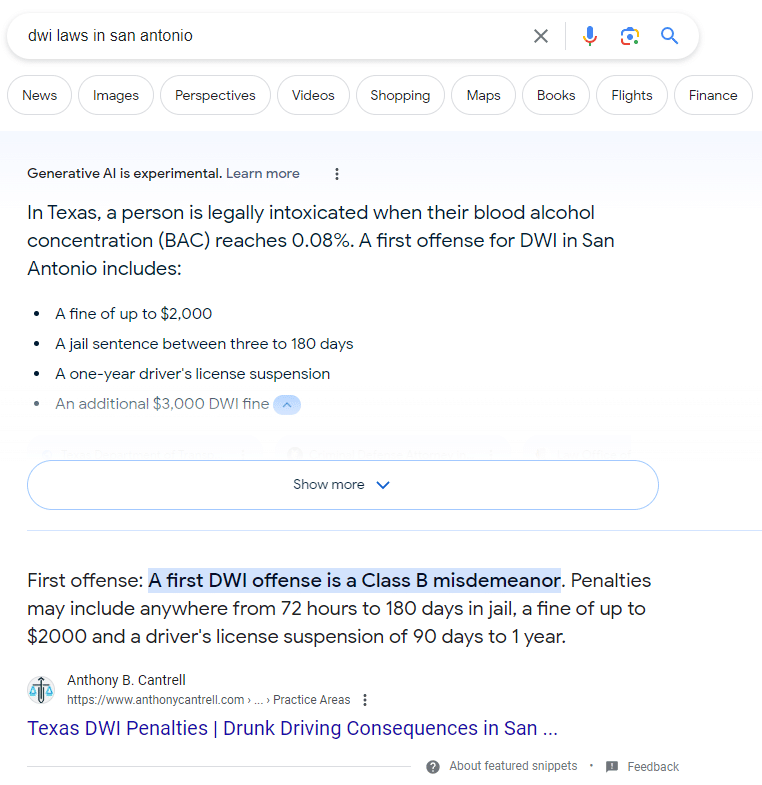
Information queries like this usually reflect a potential client at the beginning of the customer journey (awareness).
Ranking for these keywords involves creating comprehensive guides, FAQ sections, and blog posts that address common legal questions and provide valuable information to users in this stage of their journey.
Observe this search for “best DWI lawyer in San Antonio.”
With this query, the intent is clear: the searcher is seeking a top attorney to support them with a DUI charge (commercial intent).
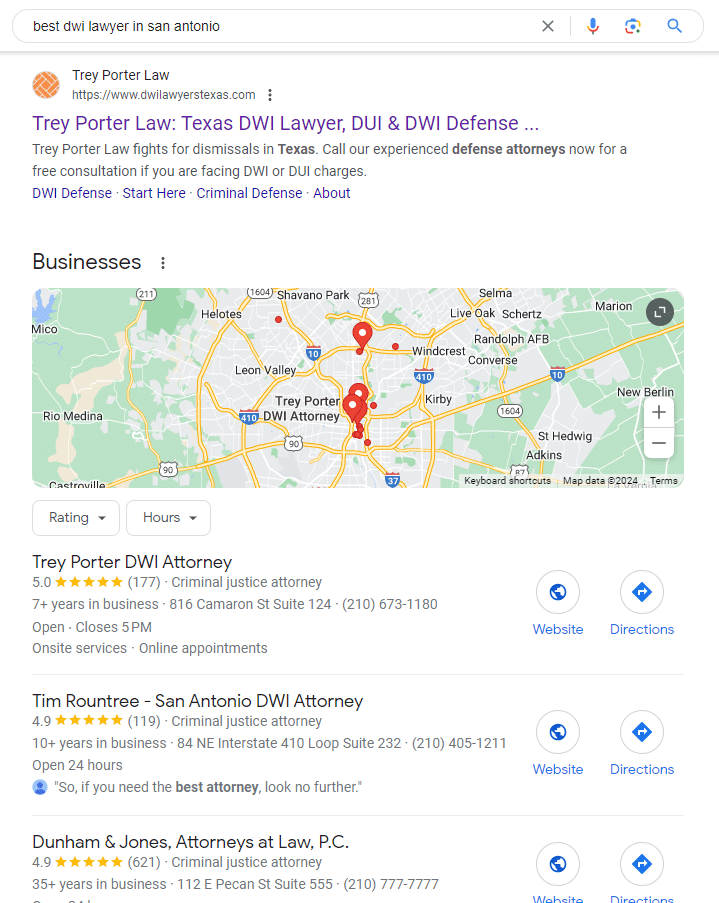
Google’s search results for the term include the Google Business Profiles for firms with optimized profiles and plenty of reviews. The organic search results on page one mainly feature lawyer directory entries rather than individual law firms.
They’re ultra-competitive and very difficult to rank for (a common trait of commercial queries like this). But these keywords are crucial for local SEO.
A lot goes into ranking for keywords with commercial intent, including optimizing your Google Business Profile and local SEO (which we dive into in another chapter). But to start, consider highlighting case studies and client testimonials and getting your name out in the local press.
Let’s say they decided to go with the top result in Google and search “Trey Porter DWI Lawyer.”
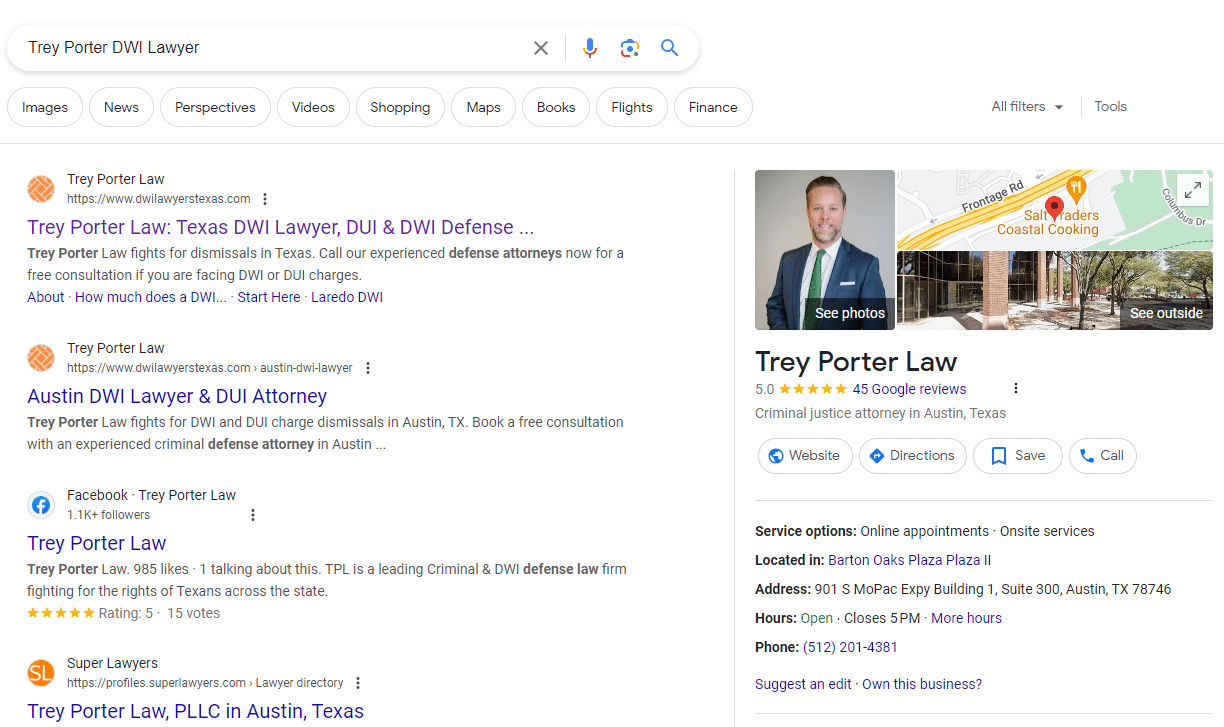
This search is a “branded query” where a user seeks information about a particular law firm.
The intent may be to evaluate this firm’s services so Google returns relevant results related to the firm.
You’ll usually rank for branded queries with little work, but if you’re just getting started with SEO, you might need to put some legwork in. Make sure you have detailed attorney bios on your law firm’s website, as well as clear contact information.
Now, let’s assume the journey is nearing its end.
They did the research, compared options, and decided to pursue Trey Porter DWI Lawyer. Their next search may be “Trey Porter DWI Lawyer Pricing.”
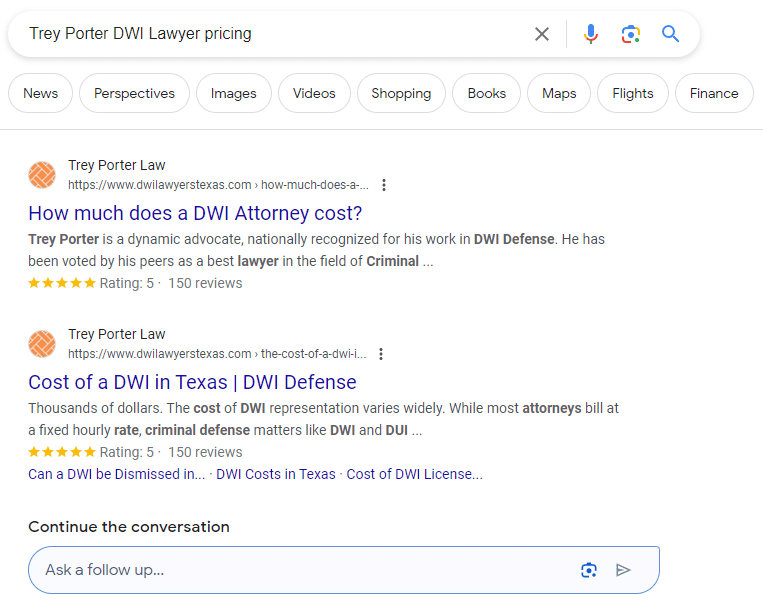
Pursuing this keyword in your strategy is important because the conversion is very high. They’ve essentially made their decision!
Again, your website will likely rank for these keywords quite easily. The real work is to convert those visitors into leads.
That involves including clear calls-to-action on your sales pages, offering free consultations, and making it as easy as possible for someone to contact you.
Ultimately, best-practice keyword research for lawyers understands the difference between the stages of the customer journey and the types of queries that relate to each — targeting keywords that cover every stage.
By understanding search intent, you can identify what the user is looking for and target profitable keywords by shaping your content around these terms.
Navigating keyword research can seem like a daunting task, especially in the competitive legal industry. However, with a systematic approach, you can uncover the keywords that will drive the right kind of traffic to your website.
Let’s dive deeper into each step of the keyword research strategy for lawyers.
Start with what you know best — your practice areas.
Whether it’s family law, criminal defense, estate planning, or personal injury, each area has its unique audience and search terms. Understanding the nuances of each practice area helps you identify relevant keywords and craft content that speaks directly to potential clients’ needs.
Maybe your website already reflects this step, like Strategic Criminal Defence Law does below.
Seed keywords are broad terms that relate closely to your practice areas. For example, “divorce lawyer” or “DUI attorney” could be seed keywords.
From there, branch out to specific variations. Consider how your clients speak and the questions they might ask. “Affordable divorce lawyer in [City]” or “DUI defense strategies” are examples of specific variations that can attract more targeted searches.
General Q&A websites like Quora and Reddit, along with legal-centric websites like Avvo, Lawyers.com, and Justia, are treasure troves of real questions asked by real people.
These platforms can provide a wealth of long-tail keyword ideas that you might not find using traditional keyword tools. Pay attention to recurring themes and questions related to your field.
This step is about listening to your potential clients’ voices and understanding their concerns from their perspective.
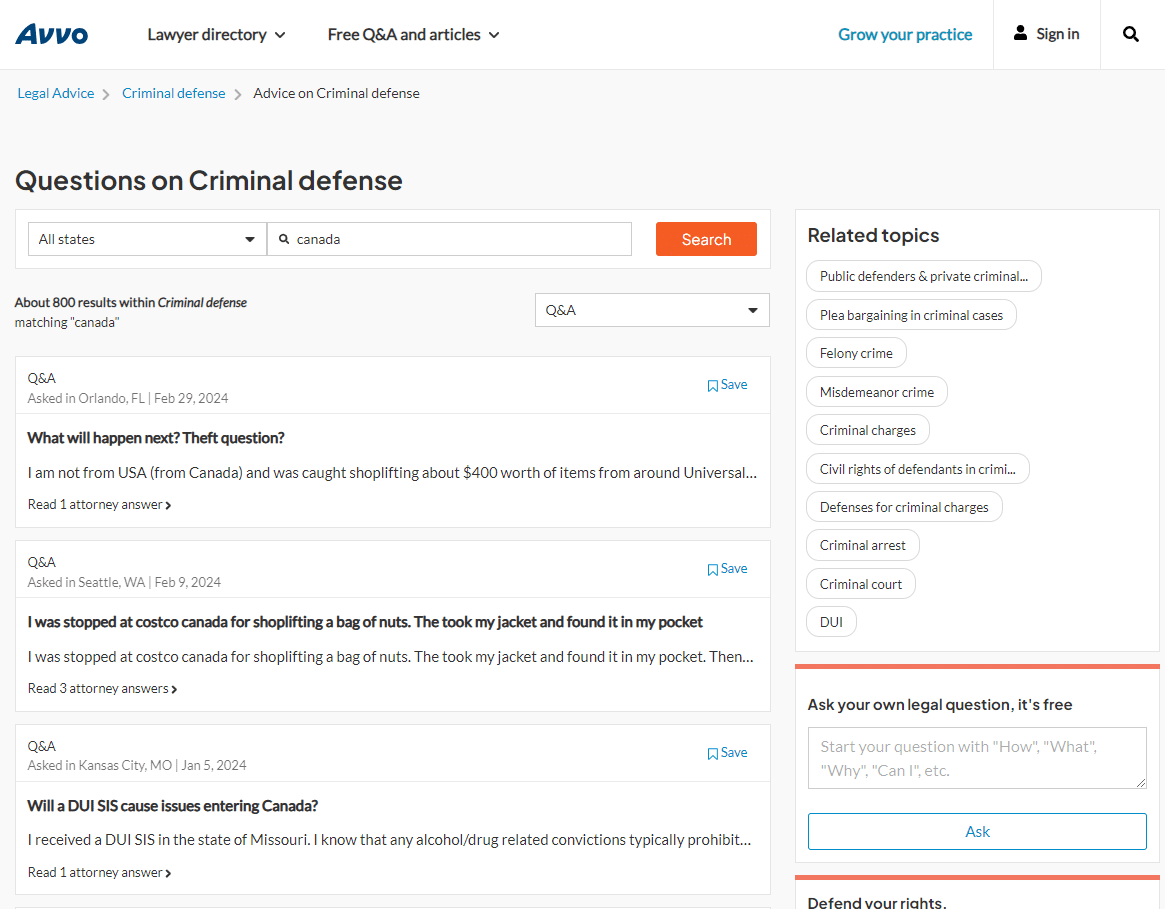
For most legal services, locality plays a huge role.
People often search for lawyers near them. Including city names, neighborhood names, or even local landmarks in your keywords can help you capture this audience. “Estate planning attorney in [City Name]” or “personal injury lawyer near [Landmark]” are examples of how you can localize your SEO efforts.
Behind every search query is an intent.
Some users seek information, others are comparing options, and some are ready to hire a lawyer. Tailoring your keywords and content to match these intents is crucial. Analyze the keywords to determine the intent behind them and ensure your content addresses what the searcher is truly looking for.
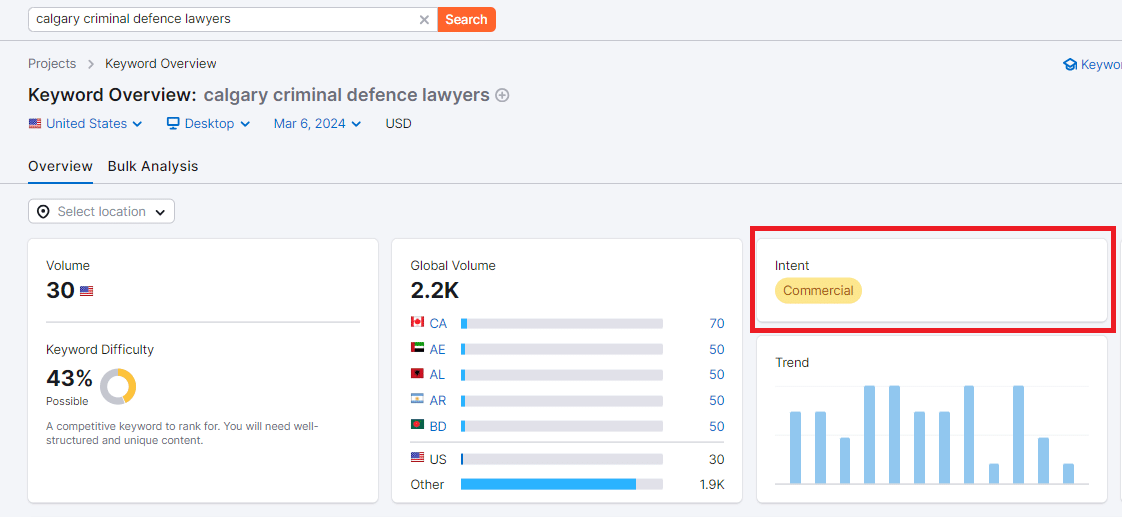
Armed with a preliminary list of keywords, it’s time to leverage keyword research tools such as Semrush, Ahrefs, and Google’s various options.
These tools can help you expand your list with related search terms, evaluate the monthly search volume for each keyword, and assess how difficult it might be to rank for them. Don’t overlook the power of these insights; they can significantly influence your SEO strategy’s direction.
Knowing what your competitors are doing is key.
Identify who they are, what keywords they’re targeting, and how they’re structuring their content. This doesn’t mean you should mimic their strategy entirely but understand the competitive landscape. It could reveal gaps in their approach that you can capitalize on or inspire new angles for your content.
With research from the above steps, compile a comprehensive keyword list.
This list should be diverse, covering broad terms, long-tail phrases, local keywords, and any questions that might bring potential clients to your site. This list is your SEO roadmap, guiding the content you’ll create and optimize.
To make your SEO efforts more manageable and effective, organize your keywords into clusters related to specific topics or practice areas.
This not only helps with creating a structured content strategy but also improves your website’s topical authority in the eyes of search engines.
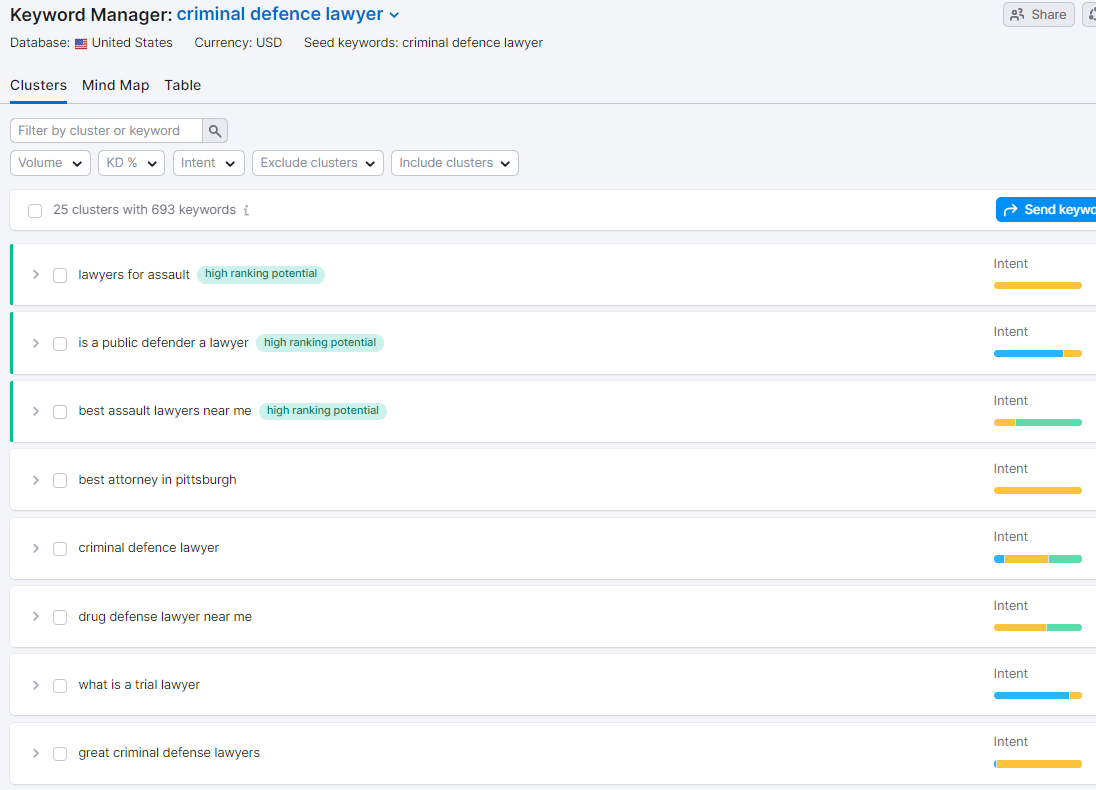
Finally, prioritize your keywords.
Consider factors like search volume, difficulty, relevance to your practice, and alignment with user intent. Ranking your keywords helps you focus on optimizing for the ones that offer the best opportunity to attract the right audience to your law firm.
By thoroughly understanding each step and applying a focused approach to your keyword research, you’ll be better positioned to attract potential clients actively seeking legal advice and services.
Remember, the goal is not just to increase traffic but to drive meaningful engagements that can grow your practice.

“My website continues to dominate all the top website searches in my industry and my business has grown 10-fold as a result.”
Oykhman Criminal Defence
If keyword research is starting to sound like hard work for lawyers, fear not.
Yes, legal keywords are competitive, and getting them right is important. But finding profitable keyword opportunities is made much easier by the abundance of keyword research tools available.
Many of these are completely free and only cost time. If you hire SEO specialists, like most firms, it won’t cost you any time.
With a few clicks and keystrokes, these tools will provide plenty of strong keyword suggestions and tell you how difficult it is to rank for these keywords.
All of the following tools make keyword research for lawyers a lot easier.
Google is the undisputed king of search, with more raw data than any other platform, the best analytics tools, and the broadest reach.
It shouldn’t be surprising, therefore, that anything offered by Google to help with keyword research for lawyers is worth considering. The suggestions are based on a very broad cross-section of the internet.
Google’s Keyword Planner tool can help you identify keywords and check their search volumes in detail.
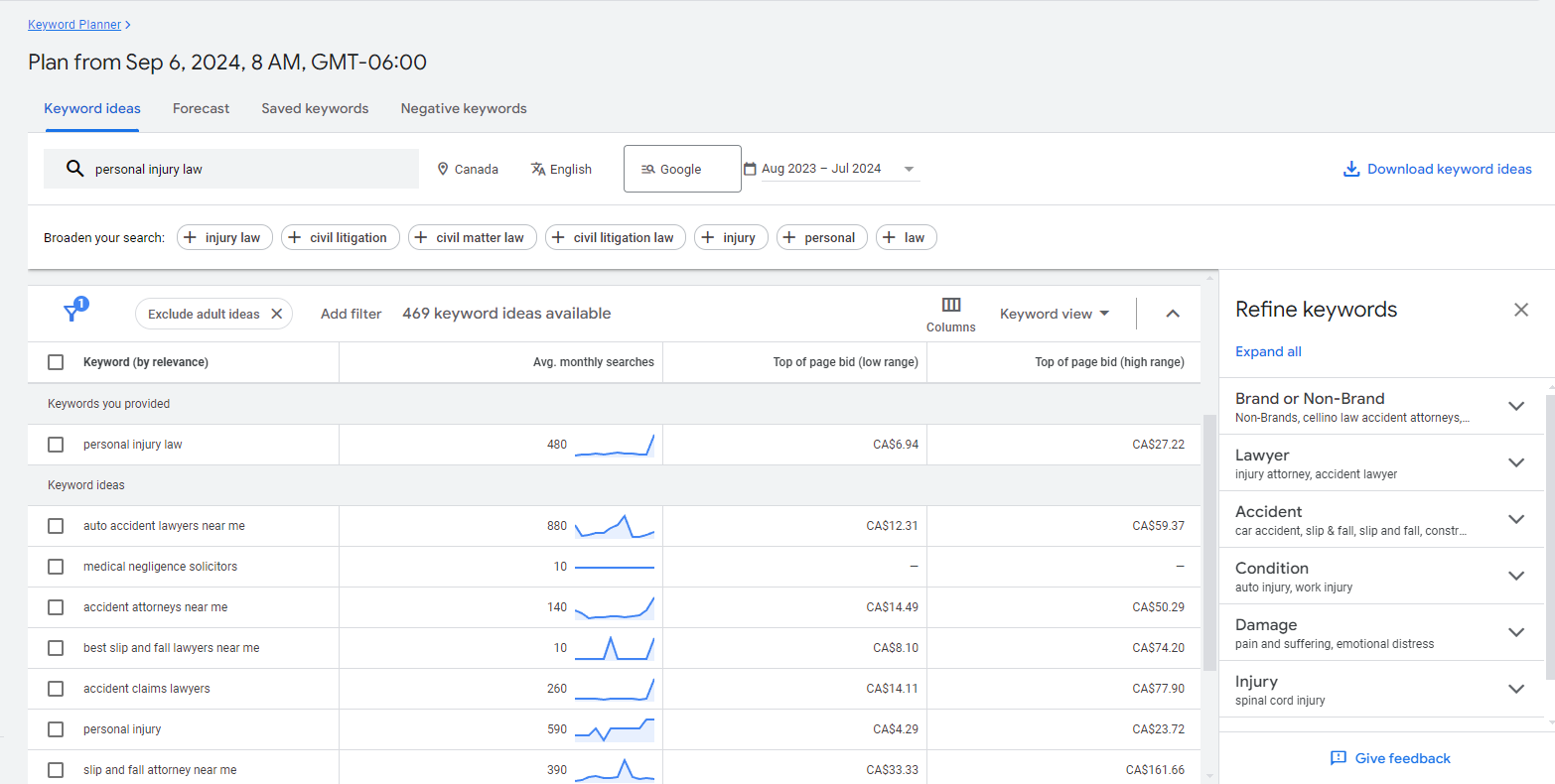
We’ve already established that search volume isn’t everything — the most-searched-for terms generally have low conversion rates and are very competitive.
However, there’s no point in targeting keywords your audience is not searching for. So, it’s important to understand the search volume of each major keyword phrase you target.
Google Trends is another free-to-use Google tool that may be of use to some firms. Law firm content is less susceptible to “trends” than other businesses, but this tool can help to identify if a specific keyword is trending upwards or downwards over time.
A good example is cannabis legislation, which is a hot topic in many states, meaning that cannabis business lawyers may be looking for related keywords that have started trending.
Take a look at the following Google SERP (search engine results page) for the query “what are the property division laws in Calgary?”
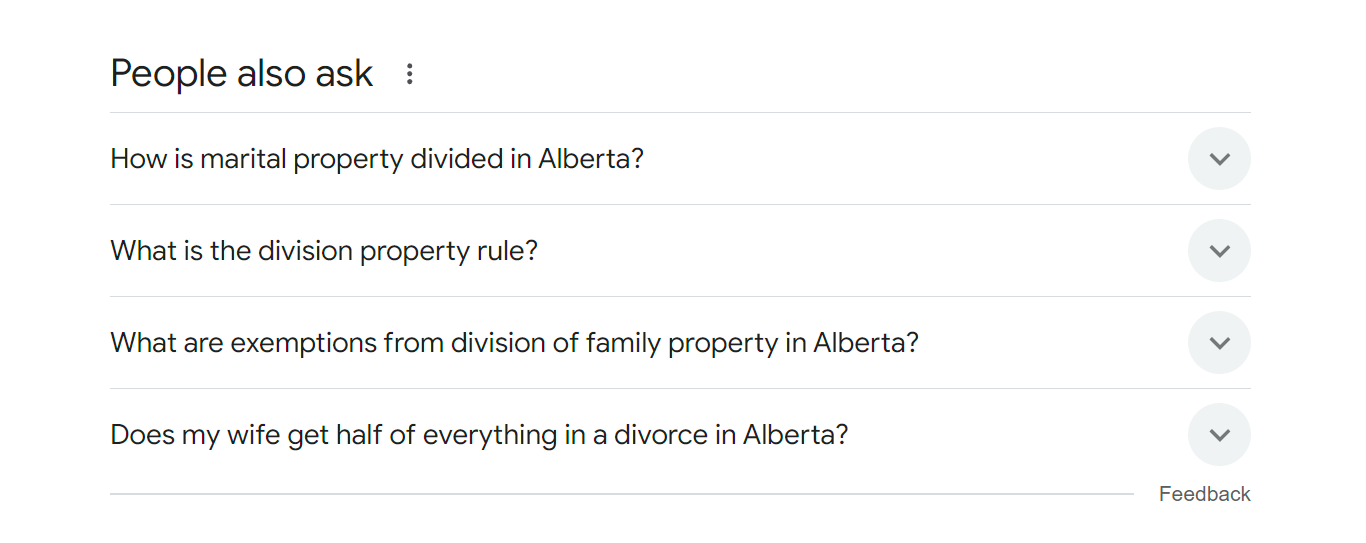
Below the featured snippet at the top is the “People also ask” section.
This features related questions and is a veritable goldmine of keyword phrases for law firms to target:
Google generates these questions from thousands of potential options. The listed ones are considered the most closely related to the original search query. These and other FAQs can be ideal keyword phrases on which to base articles, blog posts, and other content on your website.
Another tool that is staring lawyers in the face is featured at the bottom of every Google SERP: the “Related searches” section.
A query for “who can write a will in Chicago?” includes this section at the foot of the page.
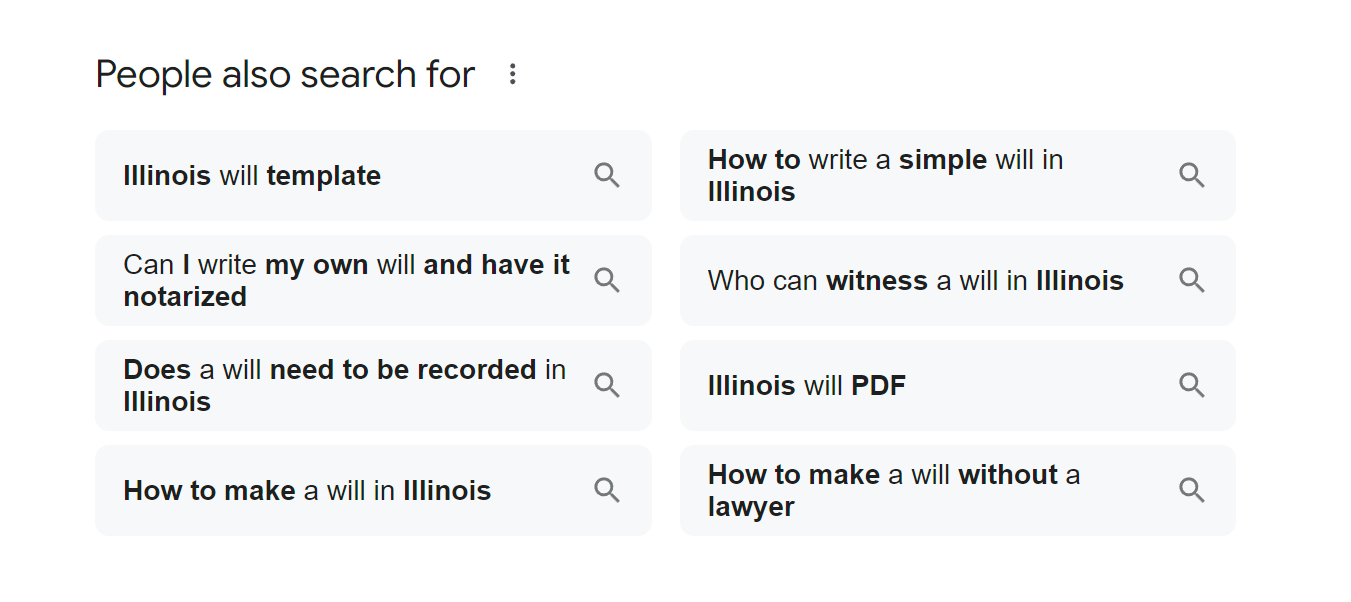
As you can see from this example, the types of related searches might be excellent keyword suggestions for an estate planning law firm in Illinois to target on its legal blog.
We’re still not done with the Google tools for keyword research for lawyers.
Google Search Console is best known for providing stats on website performance but you can also gather important keyword data.
Simple click “Search results” on the left-hand side and you’ll see which Queries are bringing in traffic.
Unlike the other tools covered so far, Ahrefs is a paid tool. It’s one of the most comprehensive tools covered here because it provides competitive analysis and keyword research. For some law firms, this justifies paying a small fee.
With its Keyword Explorer, you can enter a term like “divorce lawyer” and a few related keywords like “divorce attorney,” “child custody attorney,” and “alimony attorney.”
You can enter more than three keywords at a time, but they should be thematically similar so that you can target the right keyword topic clusters in your content.
Ideally, you’ll identify some keywords with not only a high search volume (100+) but also low keyword difficulty scores (generally under 30 means they are less competitive and fairly easy to rank for).
The “Questions” section of “Keyword Ideas” also generates keyword phrase ideas for informational query keywords.
In the “Top Pages” section of the Ahrefs tool, you can type in the keywords you’re trying to rank in your location and find the top-ranking competitor pages.
Once you identify these top competitor pages, you can analyze the quality of the content and start planning to improve on this with the content you develop — which should get you higher rankings over time.
Semrush is another leading tool for keyword research for lawyers.
It’s actually a suite of six different tools:
This may seem like overkill for some firms.
However, a good way to use Semrush for keyword research is to first identify your top competitors and then enter their URLs through Semrush’s “Organic Research” feature — then “reverse engineer” what they are doing but do it better.
Other FAQs to target during the informational/awareness stage of the customer journey can be sourced by referring to the Q&A sections on legal forums.
Three of the best sources are the Avvo forum, the Lawyers.com forum, and the Justia forum, all of which allow users to ask questions and receive free legal advice from qualified lawyers.
Here are the latest questions asked about employee discrimination law on the Avvo forum, for instance.
Answer the Public is a tool by Neil Patel. This one is great for generating long-tail keyword phrases in the form of questions (who, what, when, where, why).
As you will see from the following example — a simple search for “estate planning lawyer — the sheer number of results generated” is amazing (you can download the results as a .csv file).
Choosing the right keywords is about finding a balance between phrases with high volume and low competition.
Keyword research for lawyers is certainly partly science — the tools outlined above will help you with identifying potential phrases, volumes, and competitiveness. They can also help you analyze the top-ranking competitors for the keywords you have identified.
From there, the science ends, and the art begins. To get rankings on page one of Google for your chosen keywords, you must create the best content for those keywords.
Or you can hire a lawyer SEO service to naturally increase traffic, lead generation, and client numbers.
Ready to maximize your marketing budget? Fill out the contact form or call us today for a complimentary consultation. We will listen to your story, work to define your business objectives, and recommend an approach to deliver maximum ROI for your firm.
By using this website, you consent to our use of cookies in accordance with our Cookie Policy. Cookies help us enhance your browsing experience and provide personalized content. If you do not agree to our use of cookies, please adjust your browser settings accordingly.